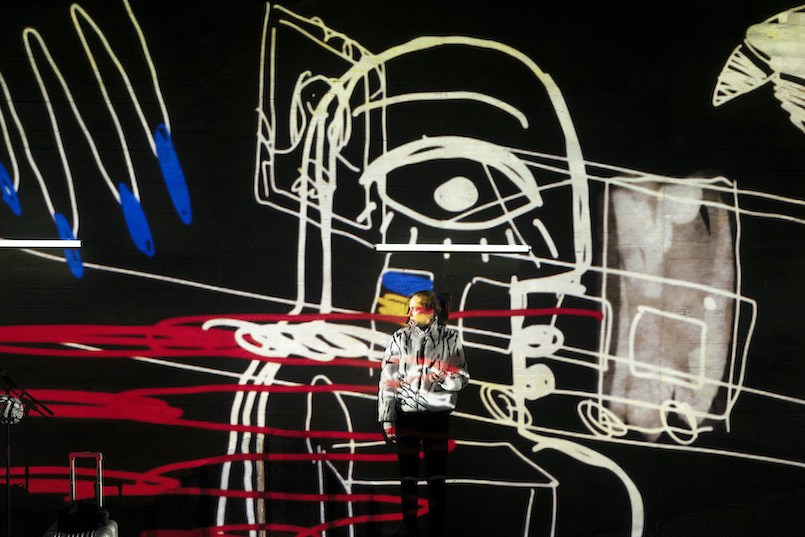Put death on the wall!
Jan-Christoph Gockel gives the world premiere of Natalka Vorozhbyt’s play about the escape from Ukraine. Munich has never seen anything like this before.

When we take our seats, five characters are already on stage. They have suitcases with them, leaning against the dreary concrete wall in the semi-darkness. But is this really the back wall? We didn’t remember the Therese-Giehse-Halle so small. The lights go out, the music starts and something magical happens: like an ice scraper, Sofiia Melnyk scrapes out spots of light that illuminate the silhouettes of the figures. The artist is sitting on the stage herself, working on a tablet. The whole stage space is a projection screen on which Melnyk draws her animations. She paints the world with a wide brush, then scribbles abstract furniture and props. Initially, she labels the characters with their role descriptions. All of them are fleeing from Ukraine and have experienced very different things.
Changing diapers at the border
Anton Berman is usually busy playing the live music, but now he slips into the role of the border guard, who asks the refugees individually for passport control. He asks the housewife from Kharkiv (Maryna Klimova) for the father’s notarized consent to take their three children abroad. The father is lying in the trench, together with the notary. He pushed her to flee, she says. The bureaucrat remains strict. Only when the woman threatens to change a diaper on his counter, he waves her through to Europe.
It is one of numerous black-humorous to absurd scenes in Natalka Vorozhbyt’s commissioned work for the Münchner Kammerspiele, in which her own experiences of escape have also been incorporated. There is the Ukrainian, who is allowed to leave because he also has a Canadian passport and who is profiting from the drop in the price of Spitz (the dogs) from Ukrainian breeding; the social worker in the refugee shelter, who lets herself be comforted by refugees because all the suffering becomes too much for her; or the housewife who has to witness her husband being hit by a rocket in the middle of orgasm during remote sex via Skype.
Torn back and forth
We are constantly torn between loud laughter and crying. Vorozhbyt’s text is already fabulous in itself, but Jan-Christoph Gockel’s staging does not rest on it at any time. It is amazing what the means of the theater get out of the small, claustrophobically narrow stage and what the ensemble tirelessly attracts in terms of presence and emotions. «Green Corridors» describes the escape of the characters and their conflicts, initially in Ukrainian with German surtitles. Gradually, the spoken German becomes more, but then the surtitles are Ukrainian.
Only the high point and turning point of the piece is free of punchlines, when the nail designer (Tanya Kargaeva), who escaped from Butscha, describes to the Austrian widower with the helper syndrome (André Benndorff) how Russian soldiers raped her for days and finally wanted to murder her. Just now she literally went up the walls, ran against the concrete and hit the wall. Now she is getting quite calm. She taps the wall once more, just with her index finger, and the wall tilts backwards. The audience holds their breath in anticipation of a loud bang, but the wall almost gently sails to the ground, slowed down by a gust of air. The view is open to the entire depth of the Therese-Giehse-Halle. «I am very grateful to the Europeans who are supporting us in this difficult time,» the nail designer is now addressing us directly. «I am very grateful that you help and remain strangers in the process. That you have that polite, indifferent look.» And she bows to us. Or is this a bagging up? A bow?
Svetlana Belesova is also outstanding as a fugitive actress who has not experienced anything terrible, but «can play anything». She is Vorozhbyt’s vehicle for including three Ukrainian historical figures in the narrative, namely as roles that the actress plays in various biopics. The poet, the composer and the fascist have in common their nationalism and that they end up as victims of political murders. Even as a refugee among refugees, the actress has to die many deaths: if it turns out that she has starred in Russian television series out of opportunism or if she annoys the others with her snobbery, they beat her to death every time.
Turn in the narrative
As the wall has turned into the horizontal, so the plot has also turned. Women have gone from trauma to productive anger. The second half of the play is her way back to life and – under the fire protection of Milla Jovovich from «The Fifth Element» (Svetlana Belesova) – back to Ukraine. A self-righteous European woman (Johanna Eiworth) makes it easy for them to say goodbye: she proudly announces that she has returned tickets for a Russian play. A contribution for which she bows.
«Green Corridors» receives a long standing ovation in Munich on Friday. Indifferent looks are not to be distinguished. It remains to be seen whether the wall between Ukraine and Europe has also fallen outside the theater. On May 10, Maksym Golenko’s parallel production of «Green Corridors» will celebrate its premiere in Kyiv.
